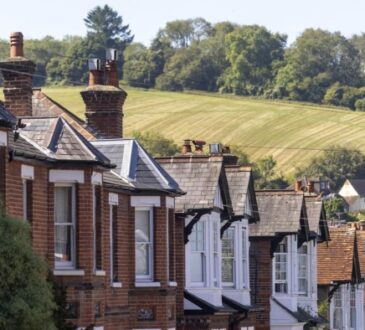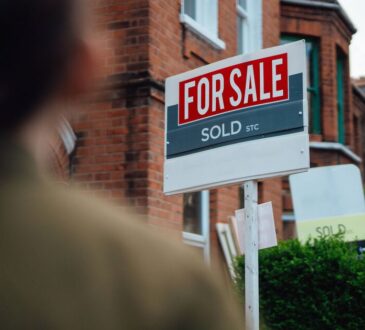
Average house prices dipped slightly on a monthly basis in June, reflecting a subdued property market amid low supply and high mortgage rates, Halifax data suggests.
The latest Halifax House Price Index shows that while annual price growth rose for the seventh consecutive month, typical values dropped by 0.2% on a monthly basis.
It follows two months of flat growth and suggests the market failed to benefit from its usual spring bounce.
Sign up to Money Morning
Don’t miss the latest investment and personal finances news, market analysis, plus money-saving tips with our free twice-daily newsletter
Don’t miss the latest investment and personal finances news, market analysis, plus money-saving tips with our free twice-daily newsletter
The average property in the UK now costs £288,455 – down £476 in a month.
Amanda Bryden, head of mortgages for Halifax, highlights that house prices have risen by just 0.4% so far this year, which she says reflects a market that remains subdued, though overall activity has been recovering.
“For now, it’s the shortage of available properties, rather than demand from buyers, that continues to underpin higher prices,” she says.
“Mortgage affordability is still the biggest challenge facing both homebuyers and those coming to the end of fixed-term deals. This issue is likely to be eased gradually, through a combination of lower interest rates, rising incomes, and more restrained growth in house prices.”
Another factor contributing to lower activity could be the general election.
Homebuyers and sellers may be hoping that Labour’s general election win will now boost the property market, with promises of first-time buyer support and more building.
Borrowers will also be waiting for an expected interest rate cut from the Bank of England in the coming months, which could bring mortgage pricing down.
“The certainty of having the next government in place will be good for the market, and we wait to see the housing policies that are prioritised,” says Tim Bannister, Rightmove’s property expert.
“We can see in our data that in previous election years, there has been a slight bounce in home-mover activity after an election has taken place – so the same could happen this year in the short term, particularly against a background of a potential bank rate cut on the horizon, and lowering mortgage rates.”
The pre-election property market
House prices rose on an annual basis across all UK regions during June, except for in East England where they fell 0.9%.
Northern Ireland recorded the strongest property price growth of any nation or region in the UK, rising by 4% on an annual basis, up from 3.3% the previous month.
In England, the steepest rate of house price inflation is found in the North West, up by 3.8% over the past year, now standing at £231,351.
London continues to have the most expensive property prices in the UK, now averaging £536,306, up 0.9% compared to last year.
Will house prices fall this year?
The property market has been held back so far this year by high mortgage rates as well as economic and election uncertainty.
Most analysts had already predicted that average house prices will be flat or could fall marginally due to high inflation and reduced purchasing power.
But inflation has slowed in recent months and there are hopes of interest rate cuts later this summer, which could bring down the cost of borrowing and boost buyer demand.
Halifax is now predicting that property prices will rise modestly through the rest of this year.
Savills has revised its own forecast from a 3% annual drop to a 2.5% rise, while Zoopla is predicting growth of 1.5%.
Estate agent Knight Frank has also changed its forecasts from a decline to average growth of 3%.
“Stubbornly-high mortgage rates and the uncertainty of a general election means the UK housing market has not experienced a particularly strong seasonal bounce this spring,” says Tom Bill, head of UK residential research at Knight Frank.
“We expect trading volumes to increase from the autumn as a rate cut becomes imminent and relative calm returns to Westminster.”
Nicky Stevenson, managing director at national estate agent group Fine & Country, suggests the market will get more busy now the election is out of the way.
“Annual house price forecasts reflect a more positive outlook than they did in the beginning of the year, helped by headline inflation reaching its target 2%,” she says.
“Inflationary pressure easing and a bank rate cut imminently expected has also positively spurred market sentiment.
“While the reduction in mortgage debt costs has been modest so far, the combination of better interest rate forecasts and a brighter economic outlook has provided more room for house price growth in the second half of the year.”
Will Labour’s general election win boost the property market?
Labour’s general election win could provide more certainty to the market, potentially pushing prices back up if demand rises.
The party has promised a Freedom to Buy scheme for new buyers but it also plans to reduce the first-time buyer stamp duty threshold from £425,000 to £300,000.
Labour has also said it will build 1.5 million homes over the next five years.
“Time will tell whether a new Labour government will help spur buyers back to the market,” says Karen Noye, mortgage expert at wealth manager Quilter.
She highlights that ambitious housing targets have historically been challenging to meet, while there is already little take-up of the existing mortgage guarantee scheme.
“Prospective first-time buyers and homeowners across the country have been crying out for help for some time now,” Noye adds.
“Labour must follow through on its commitment to increase housing supply in the first instance, and it should explore alternative options to ensure that more people are supported in getting onto the housing ladder without needing to make potentially risky decisions when it comes to high loan to value mortgages.”
Sarah Coles, head of personal finance at Hargreaves Lansdown, says the property market is likely to be near the top of the government’s agenda but there are no quick fixes.
“The market is suffering from a dearth of demand, as higher mortgage rates and sky-high house prices have priced so many buyers out of purchases,” says Coles.
“During the election campaign, there was plenty of talk of stimulating the demand side, but not from Labour.
“Aside from guaranteeing mortgages for buyers with smaller deposits, it is committed to tackling the supply side of the equation instead. It promised to get stuck into reforming the property market and the planning system, but we know this is likely to be a gradual and tortuous process.”




